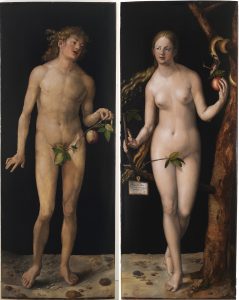46 Cosmology in Judaism
Judaism, like the other Abrahamic ethical monotheistic religions, views the universe as the creation of a single God. This God is all-powerful (omnipotent)and all-knowing (omniscient). All things in the universe are the result of God bringing them into being through His unique ability to create. God is also seen as transcendent, operating far above/beyond the world of human beings.
Unlike polytheistic deities, the God of the Hebrews was transcendent: above and beyond the world occupied by human beings. God came to be seen by the Hebrews as existing completely beyond the cycles of nature and the physical world that He created. The polytheistic groups of Canaan that surrounded the Hebrews envisioned their gods as living in the world with human beings. For instance, their gods often had children, fought with rival gods and humans, and were able to be influenced by human beings to grant certain favors. In contrast, the God of the Hebrews came to be envisioned as the only true divine entity that existed. Because of His transcendence, God could not be manipulated by human beings through rituals. The only way the God of the Hebrews could be seen was if He decided to show himself.
This description of cosmology in Jewish teachings is the result of many changes in Jewish theology (the study of God) throughout the history of the Israelites. In the religion of the ancient Hebrews, for instance, YHWH was one tribal god among many gods. Over time, YHWH came to be seen as the most important of all the gods. As this occurred, YHWH was described in more all-powerful and transcendent terms than He had been before.
This process was amplified with the changes in Judaism after the second destruction of the temple in 70 CE. Another phase of this development was introduced by Maimonides who used teachings from Christianity and Islam. Maimonides believed that God cannot be equated with human beings; God is entirely transcendent. This means that God is above and beyond his creation. These views of Maimonides have been highly influential in the establishment of contemporary Jewish theology.
Origins of the Universe and Humanity
The first book of the Torah is known as Genesis. It begins with the creation of the cosmos by God. According to the Torah, God made humans in His image by creating two human beings, Adam and Eve. He placed them in a paradise known as the Garden of Eden. They would be fine, God told them, so long as they did not eat the fruit of the tree of the knowledge of good and evil. However, a serpent (later identified as Satan) persuaded Eve to eat the forbidden fruit. Eve then convinced Adam to do the same. When God discovered their disobedience He punished Adam and Eve by casting them out of the Garden of Eden. God also made them mortal and cursed the land so that they would have to work hard to be able to survive. From this point onward, Adam and Eve tried to follow God’s commandments. When they became mortal, it became necessary for them to reproduce for the continuation of humanity. This story is taken as the justification for viewing Adam and Eve as the ancestors of all human beings.

